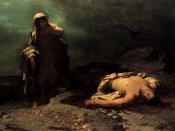In the play Antigone, Sophocles demonstrates that rigidity of one's own convictions can create terrible outcomes. Creon and Antigone represent a conflict between religion and state. Both characters have flaws that prevent peace between these two social aspects to form. While Creon believes that no one must disobey the human law, Antigone believes that there is an eternal law that is greater than that of a man. Although both hold different beliefs on which law should be followed, they are both caught in their arrogance and convictions that only they themselves are right, with no willingness to compromise or enter the middle-ground. As Creon's son, Haemon, says, "a wise man is flexible, and has much to learn without a loss of dignity." Neither character is able to attain this "flexibility" because both characters see the world as only black and white.
Creon's argument proposes that since he is "the man the gods have made...king,"
he is the divine heir to the throne. Thus, his laws must also be a divine law that must not be broken. He establishes that "to value life...one must value law." Because he has promised the public to severely punish the perpetrator who tried to bury Polyneices, he is stuck with his decision, even if it meant that he had to kill his own niece. He is thus lacking in anima, a female principle of compassion and sympathy. This recalls the story of Oedipus who, in trying to maintain a powerful authoritative figure, let his arrogance lead to the tragedy of his and his wife's deaths. Both promise a harsh punishment that cannot be reversed; they are thus stuck with the terrible fate that the punishment brings. Creon also has a civil duty, to serve his people as a powerful, decisive, and honest...


